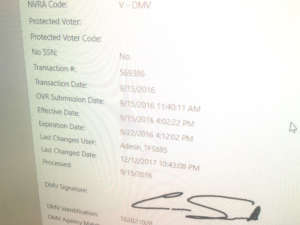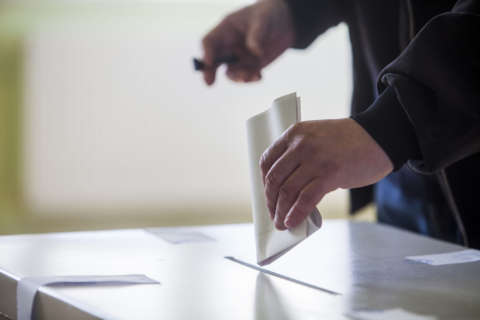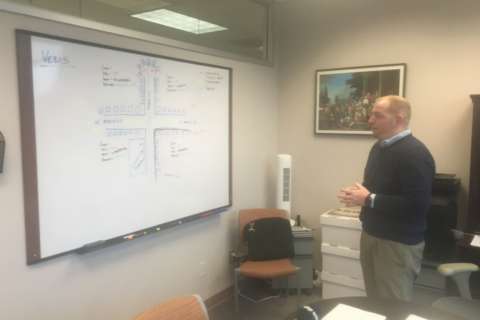WASHINGTON — Thousands of people who recently moved to Fairfax County from other parts of Virginia are set to receive notice in the next week or so that their voter registration requests have been denied. This move follows concerns about the way a state Department of Elections system handles requests submitted through the Department of Motor Vehicles, the county’s general registrar said.
To start with, that means about 5,000 letters to people who submitted some of the most recent address updates. The county’s general registrar is accepting similar voter registration updates through the Department of Elections website.
“I’m going to deny the transfer, I’m going to inform the voter that they’re still registered in [their previous jurisdiction], and I’m going to send them an application so they can fill that out,” Fairfax County General Registrar Cameron Sasnett said in an interview.
The commissioner of the Department of Elections called the decision “troubling,” and said there is no question that the electronic systems are working and providing significant benefits.
Sasnett and other Virginia registrars are concerned that address updates submitted through the DMV from July 1, 2016 until this fall wrongly appeared when printed out in registrars’ offices to be completely new applications.
That led to previous documentation for those voters being trashed, plus voter signatures appearing under penalty of perjury on printed forms that they never actually fully completed. The concerns include answers to questions about felony convictions or mental capacity.
Voter Registrars Association of Virginia President Walt Latham, of York County, described the issues as technical problems that can be corrected but that could be violating state law or leading to a lack of supporting evidence that voters are properly registered.
“It’s mainly an issue of dotting your Is and crossing your Ts,” Latham said.
Changes pop up in state system

Pulling up his own voter registration record in his office in the Fairfax County Government Center, Sasnett showed a 2016 address update that he said used to show answers that he did not provide the DMV at the time. The entry was modified in the state system on Dec. 12, 2017.
“A year and a half later? After a presidential and a gubernatorial election of which there were races that are literally going to be decided by a coin toss?” Sasnett said. “As a person who takes this very seriously, that, to me, looking at my own record, pisses me off.”
“I’d say that’s exceptionally troubling if a registrar is going to refuse to register or update registration for people who are validly registered, have done everything they’re required to do under law, just because he is not a fan of the process. That could certainly lead to disenfranchisement of eligible voters in Virginia, and that’s something that we definitely don’t want,” Virginia Department of Elections Commissioner Edgardo Cortes responded in an interview.
“I don’t think there is a problem [with the system],” Cortes said.
To him, the only issue has been that the registrars did not understand the design of certain pieces of the electronic state voter registration system.
“There is a print function, and I think where we ran into issues here is that registrars were taking an electronic process that was supposed to make things more efficient and then actually converting it into a paper-based process on the back end,” Cortes said.
“When that was brought to our attention that that’s how folks were taking this electronic process and converting it to an inefficient paper-based process, our team went in and made some changes to how the information’s displayed if you choose to print it out to make it clear what the person has done at the DMV,” Cortes added in an interview this week.
He made the same arguments in a Nov. 15 email obtained through a Freedom of Information Act request that tried to quell concerns of the state’s registrars shortly after the printable forms were changed. “The changes that were made … were simply to have the printable version more clearly identify what the voter has or has not provided,” he wrote then.
Registrars see low odds of widespread registration mistakes, but not certain
While several registrars interviewed for this story believe the odds of incorrect registrations actually happening are slim, they described the problems with the printed forms as potentially significant.
“The level of concern for me is high, because voter registration forms had data added to them where people were not asked the question. But, as far as some vast conspiracy to register illegal people to vote, I don’t see that,” Mecklenburg County registrar Jason Corwin said.
About 80 percent of Virginia voter registration or address update transactions are now done electronically, either online or through the DMV, Cortes said. The DMV has a direct connection to the voter registration database that can check on a voter’s current status.
“I think the electronic registration at DMV has been one of the most successful projects that the administration has undertaken over the past several years,” Cortes said. “It’s not only made voting easier, not only made registration easier for our eligible voters, but it’s also been one of the biggest improvements to our list maintenance processes that we have to keep our rolls accurate.”
Now though, forms submitted up to this November’s general election that originally showed complete voter information only include the address change request, which has left some registrars wondering whether they have adequate documentation to show that voters are properly registered.
“All those records now have been altered, all those answers that were originally submitted have been subsequently removed,” Sasnett said.
“The person submitted the information they submitted. We have never scrubbed data,” Cortes said, countering.
Latham, the registrars association president, described the issues as technical problems that can be corrected.
“My rub is: I need to make sure I’m in compliance with the code,” Latham said.
Virginia law requires registrars to keep registration records showing a voter’s eligibility. When a new, complete application comes in, the old one can be discarded. In the event of a paper-based address update, it can be attached to a previous form.
“Don’t change the information after people have been processed by us,” Latham said, because it makes it difficult or impossible to support a registrar’s decision to add a voter to the rolls.
“That kind of scares me,” Latham added. “You can’t just digitally erase information after we’ve looked at it.”
Registrars are also concerned about whether the qualifying questions should be asked anyway, either due to federal law or simply to make the process easier.
It was one of several additional issues Latham raised in his own email to the state’s registrars on Dec. 15 that he was not yet satisfied had been resolved. He recommended having the DMV ask voter registration qualifying questions for all transactions to reduce the workload of registrars who today have to track down original registration information for address changes.
He also said the state should notify voters who had questions automatically filled in on printed forms without their knowledge, since any documents that appeared to have false statements about felony status could have been referred for criminal prosecution.
Sasnett said the scale and complexity of the issue means there is no single, clear solution.
“I’m not really looking at it as I’m making allegations that all these voters out there are illegal voters. Mine is that there has to be integrity in the way that we handle the process,” Sasnett said.
He added, “While it may have benefited the voters, it ate away at the integrity, because now there’s a big question among even the administrators as to the data that’s in the system: Is it right?”







